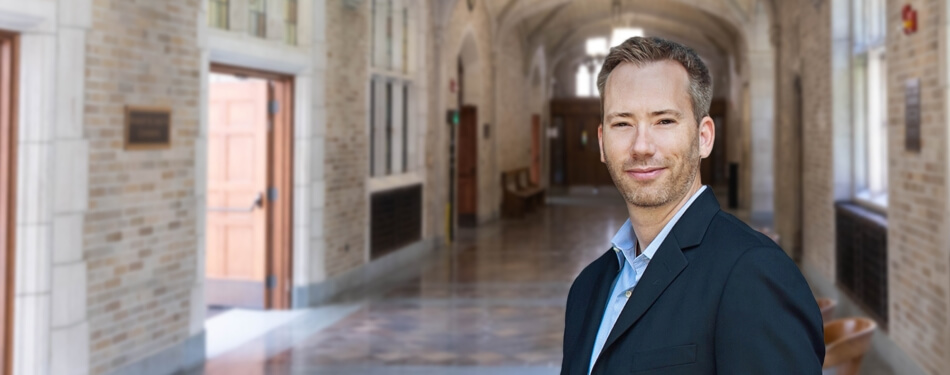Professor J.J. Prescott served as lead researcher on a landmark, multi-year project analyzing racial disparities in the Washtenaw County prosecutorial system. The team released its findings on February 16.
The Prosecutor Transparency Project is a collaboration between the Law School, the Washtenaw County Prosecutor’s Office, the ACLU of Michigan, and the University of Michigan’s Poverty Solutions. To conduct the study, the Prosecutor’s Office gave Prescott and his team full access to its criminal case management systems, containing data from nearly 35,000 cases from 2017 to 2022. The researchers analyzed the data to determine whether racial disparities exist at key prosecutorial decision-making points.

The Prosecutor Transparency Project represents the first time independent researchers have been provided access to extensive prosecutorial data in Michigan for the purpose of conducting a race-equity analysis. The study covered both felony and misdemeanor files, making the project one of the most comprehensive empirical studies on prosecutorial decision-making in the nation. The study also traverses two prosecutorial administrations, as Prosecuting Attorney Eli Savit, ’10, took office in 2021.
The research team was led by the Law School’s Prescott and Grady Bridges. Prescott—the Henry King Ransom Professor of Law, co-director of the Empirical Legal Studies Center, and co-director of the Program in Law and Economics—is one of the nation’s top empirical criminal justice scholars. Bridges, a research scholar, has years of experience collecting and analyzing Michigan criminal justice data and served as data administrator for Michigan’s Criminal Justice Policy Commission.
“The prosecutor and his team were always vigilant about protecting people’s privacy, but the office also made sure we had access to every bit of information we asked about that might be relevant to measuring disparities,” Prescott said. “Throughout the entire process, the prosecutor has been eager for unvarnished answers so the office can continue to improve. PTP’s assessment in Washtenaw County provides a clear roadmap for conducting similar audits throughout Michigan and the nation.”
Previous analyses—including the 2020 Citizens for Racial Equity in Washtenaw report—have indicated that Black residents in Washtenaw County are disproportionately likely to face criminal charges. Although the Transparency Project focused specifically on prosecutorial decision-making—and did not purport to reach any conclusions about other systems actors—the new analysis found that these numeric disparities are largely “baked in” by the time cases arrive at the Prosecutor’s Office.
“The comprehensive nature of this study also puts Washtenaw County and Michigan more generally on the map in terms of evidence-based evaluation of prosecutorial decision making,” Prescott said.
He noted that the team’s analysis improves on other studies that have explored racial disparities in prosecutorial decision-making.
“Most existing work focuses on specific types or classes of cases, or suffers from significant data limitations that make it hard to pinpoint the sources of disparities. Our evaluation is not without weaknesses, of course, but we use the ‘blind spots’ in data collection and management that we uncover to shine a bright light on the need for critical data infrastructure improvements. For this reason, this collaborative effort takes an important step toward the goal of measuring, understanding, and working to eliminate disparities in prosecutorial decision-making.”
Controlling for factors such as the severity of a case, the researchers identified small disparities in certain prosecutorial decisions and no evidence of disparities in others.
Specifically, the study concluded:
- The Prosecutor’s Office was 0.7 percentage points more likely to authorize charges for defendants of color than for white defendants between 2017 and 2022. Though that disparity is marginally statistically significant, its statistical significance is driven by data from one year (2019).
- Defendants of color were charged with crimes having maximum sentences 2.15 months longer than white defendants in similar circumstances, with statistically significant disparities that were larger in 2018 and 2020.
- Among eligible defendants, people of color are less likely than white people to be designated as habitual offenders. A habitual offender designation means longer maximum sentences.
- Defendants of color faced 0.05 more charges per case on average than white defendants in similar circumstances between 2017 and 2022.
“Consequences in the criminal legal system should be imposed because of what someone did, not because of who they are,” said Savit. “I’m grateful to the research team for taking an unflinching look at potential racial disparities in prosecution. I am also grateful to the ACLU for funding this project, allowing this work to be completed without taxpayer expenditure. The data from this report will inform our continuing efforts to promote equal justice in our system.”
Next steps for the Prosecutor Transparency Project include the identification of trackable metrics to ensure equitable treatment in the justice system and the creation of an interactive “data dashboard” for the Prosecutor’s Office. Results will continue to be made available as they are completed.







